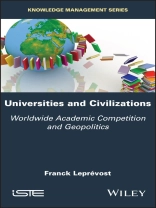Since the publication of the first Shanghai ranking in 2003,
the international rankings of universities have become evermore important. This book examines the evolution of higher
education systems and the role of universities in
contemporary societies, which are marked by increased
competition and tensions.
Investigating whether the dynamism of large universities is
an accurate indicator of the intellectual life of their
civilizations, Universities and Civilizations systematically
analyzes the evolution of universities in several main
rankings, from their creation until now.
This analysis shows the rise of universities in China and
parts of Europe, the decline of American and Japanese
universities and the scant presence of universities in Russia,
India, Africa and Latin America.
This book suggests an overhaul of traditional models of
academic cooperation and exchange in an era of growing
international tensions and a time when people and
knowledge are increasingly mobile.
Table des matières
Foreword vii
Preface: Elements of Genesis xi
Acknowledgements xv
Chapter 1. The Origin of a Triptych 1
1.1. The sun is shining in Berkeley 2
1.2. Fukuyama versus Huntington: the revenge of civilizations in the 21st Century 3
1.3. The role of universities in the race for global intellectual leadership 5
1.4. Why? Where? How? 8
Chapter 2. Why? 15
2.1. The purpose of universities 15
2.2. International rankings and world academic elite 16
2.3. What is the role of a leading university? 18
2.4. What are the reasons for the intellectual arms race? 21
Chapter 3. Where? 29
3.1. The ‘Big Four’ and their methodologies 33
3.2. Analysis of the Top 20 37
3.3. Analysis of the Top 200 41
3.4. Analysis of the Top 1000 48
Chapter 4. How? From Russia with 5-100 59
4.1. The land of the Tsars, of snow and Doctor Zhivago 59
4.2. The Russian excellence initiative: the 5-100 program 60
4.3. The results of the 5-100 program in 2019 65
4.4. Obstacles to Russian academic excellence 72
4.5. Analysis and options: brain, heart and soul 76
Chapter 5. Conclusion: Analysis and Perspectives 89
5.1. Winners of the race for global academic leadership 90
5.2. Europe – Paul Valéry’s anticipation 92
5.3. Universities for what? Automation, demographics and flow 95
5.4. Work and occupation: the need for a political project 103
5.5. Western civilization – the judgment of ‘elementary particles’ 104
Appendices 107
Appendix 1. Huntington’s Country – Civilization Dictionary 109
Appendix 2. Top 20 Rankings 113
Appendix 3. Top 200 Rankings 123
Appendix 4. Top 1000 Rankings 141
Appendix 5. Continental and Western Europe 155
Appendix 6. Europe: 5 + 1 163
Notes, Insertions and Tangents 171
References 201
Index 209
A propos de l’auteur
Franck Leprevost is an internationally renowned scientist
and Professor at the University of Luxembourg, of which he
was Vice-President from 2005 to 2015. His expertise in
academic positioning and strategy is sought after by many
universities, institutions and governments.












